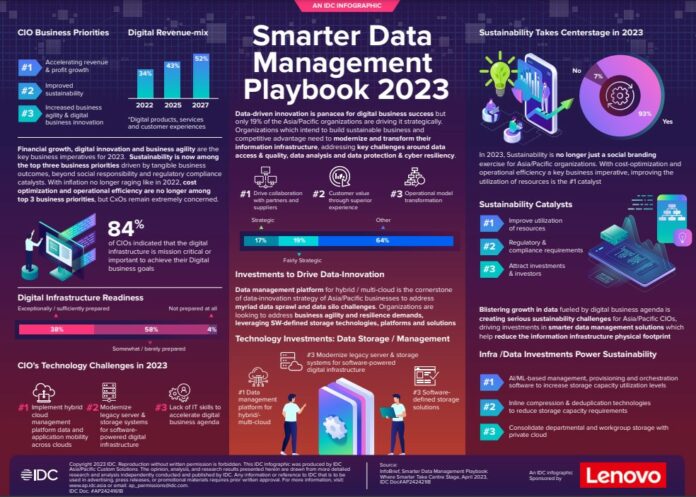While data-driven innovation is critical for digital success and driving myriad business outcomes, the lack of cyber resiliency, growing AI/ML workloads, and limited data mobility in hybrid cloud impede data innovation.
This was among the key findings of Lenovo’s first-ever “Smarter Data Management Technology Playbook,” which captured insights from 550+ CIOs across the Asia-Pacific region.
The IDC-led report highlighted the current state of the data management landscape, as well as the digital maturity and readiness of CIOs to meet the data challenges and priorities now and in the future.
In ASEAN+, specifically Singapore, Indonesia, Thailand, Taiwan, and Hong Kong, 99% of CIOs plan to accelerate their data innovation journey in the next two years.
To become digital natives, CIOs will need to accelerate IT modernisation and transformation. This also addresses the key challenges around data protection and cyber resiliency, data mobility across hybrid/multi-cloud environments, and application performance and transaction throughput.
Digital maturity
Businesses in APAC expect 52% revenue to be digitally driven by 2027, but only 39% are at Stage 3 or 4 of digital maturity, which indicates a well-defined, multi-year execution roadmap of an organisation.
In ASEAN+, close to 24% of businesses are at Stage 4 of digital maturity, while nearly 59% are at Stage 1 or 2. The lack of competitive pressure and cultural resistance to change hinder the transformation journey.
“In ASEAN+, 54% of businesses expect to generate revenue from digital products and services by 2027. This presents a huge growth opportunity as the reliability and need to become digitally native is rapidly growing,” said Kumar Mitra, Managing Director and Regional General Manager – CAP at Lenovo ISG.
Digital infrastructure readiness
A majority of APAC businesses, accounting for 84%, consider digital infrastructure to be mission-critical or important for achieving business goals.
However, only 38% are exceptionally or sufficiently prepared to maintain standard service levels, security, and cost-optimisation during events of unexpected business demands.
Digital readiness and the strategic importance of digital infrastructure determine an organisation’s ability to drive business goals and priorities. In ASEAN+, 45% of businesses reported having sufficiently or exceptionally prepared digital infrastructure, which is one of the highest rates in APAC, alongside Australia and New Zealand.
Additionally, 85% of CIOs in ASEAN+ consider digital infrastructure mission-critical or important. To attain Stage 3 or 4 of digital maturity, organisations must leverage future-ready IT driven by hybrid cloud platforms to utilise real-time business insights that lead to investment-focused outcomes.
“Data innovation acts as a compass for CIOs, providing guidance to unlock new business opportunities and achieve digital success. By harnessing the power of data, companies can gain valuable insights to improve productivity and stay ahead of the competition,” said Nigel Lee, Director of Storage – AP, Lenovo ISG.
Information management
Increasing deployment options, whether public, private, hybrid, or multi-cloud, have led to challenges around data residing in silos. Businesses in APAC are significantly investing in data storage and information management technologies for hybrid cloud, public cloud, and software-defined storage.
Data management platform for hybrid/multi-cloud is the number one investment priority (53%) for CIOs across all APAC, including ASEAN+, where over 58% plan to invest in it over the next two years.
In the market, 45% of businesses are looking to invest in public cloud for data backup and business continuity, while 43% are looking to invest in edge infrastructure and applications.
Unified data management
A unified management platform is key to securing competitive advantage. Only 16% of the organisations in APAC indicated that they have managed to build a single data management platform. According to IDC, 29% of organisations have managed to minimise the number of data management platforms and made significant progress.
Meanwhile, 35% of businesses in ASEAN+ have successfully minimised the number of data management platforms they use. Compared to other APAC markets, businesses in ASEAN+ have the lowest usage of multiple data management platforms, with only 44% reporting their usage.
















